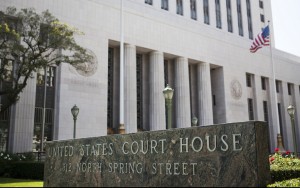LOS ANGELES
 Federal agencies announced Thursday that Western Union Company, a global money services business headquartered in Englewood, Colorado, agreed to forfeit $586 million.
Federal agencies announced Thursday that Western Union Company, a global money services business headquartered in Englewood, Colorado, agreed to forfeit $586 million.
Western Union admits to criminal violations, including willfully failing to maintain an effective anti-money laundering program and aiding and abetting wire fraud, according to the Department of Justice.
According to admissions and the evidence, between 2004 and 2012, Western Union violated U.S. laws – the Bank Secrecy Act and anti-fraud statutes – by processing hundreds of thousands of transactions for Western Union agents and others involved in an international consumer fraud scheme.
As part of the scheme, fraudsters contacted victims in the United States and falsely posed as family members in need or promised prizes or job opportunities.
The fraudsters directed the victims to send money through Western Union to help their relative or claim their prize.
Various Western Union agents were complicit in these fraud schemes, often processing the fraud payments for the fraudsters in return for a cut of the fraud proceeds.
Western Union knew of the fraud schemes but failed to take action against it.
Beginning in at least 2004, Western Union recorded customer complaints about fraudulently induced payments in what are known as consumer fraud reports.
In 2004, Western Union’s Corporate Security Department proposed global guidelines for discipline and suspension of Western Union agents that engaged in fraud transactions.
In these guidelines, the Corporate Security Department effectively recommended automatically suspending any agent that paid 15 Consumer Fraud Reports within 120 days.
Had Western Union implemented these proposed guidelines, it would have prevented significant fraud losses to victims and would have resulted in corrective action against more than 2,000 agents worldwide between 2004 and 2012, according to officials.
Court documents also show Western Union’s BSA failures spanned eight years and involved, among other things, the acquisition of a significant agent that Western Union knew prior to the acquisition had an ineffective MWWoney Laundering program and had contracted with other agents that were facilitating significant levels of consumer fraud.
Despite this knowledge, Western Union moved forward with the acquisition and did not remedy the AML failures or terminate the high-fraud agents.
Similarly, Western Union failed to terminate or discipline agents who repeatedly violated the BSA and Western Union policy through their structuring activity in the Central District of California, the Eastern District of Pennsylvania, New York City and elsewhere.
The BSA requires financial institutions, including money services businesses such as Western Union, to file currency transaction reports (CTRs) for transactions in currency greater than $10,000 in a single day.
To evade the filing of a CTR and identification requirements, criminals will often structure their currency transactions so that no single transaction exceeds the $10,000 threshold.
Financial institutions are required to report suspected structuring where the aggregate number of transactions by or on behalf of any person exceeds more than $10,000 during one business day.
Western Union knew that certain of its U.S. Agents were allowing or aiding and abetting structuring by their customers. Rather than taking corrective action to eliminate structuring at and by its agents, Western Union, among other things, allowed agents to continue sending transactions through Western Union’s system and paid agents bonuses.
Despite repeated compliance reviews identifying suspicious or illegal behavior by its agents, Western Union almost never identified those agents as the subjects of required reports to law enforcement
In California, an investigation by the FBI’s Los Angeles Field Office, IRS Criminal Investigation and local partners into Western Union’s largest West Coast agent found that U.S. Shen Zhou International in Monterey Park sent more than $310 million in Western Union transactions to China – approximately 50 percent of which were structured.
The owner of Shen Zhou – Zhihe “Frank” Wang, 60, of Monterey Park – plead guilty late 2013 to one count of structuring international transactions to evade reporting requirement in Santa Ana federal court.
Wang admitted making numerous transmission to China in $2,500 amounts, which is just below the $3,000 amount that triggers various Bank Secrecy reporting and record-keeping requirements for money transmitters, as well as the $10,000 amount that triggers CTR filings.
Despite finding repeated violations of Western Union policies, Western Union took no disciplinary action against Shen Zhou beyond one 90-day probation in January 2006 during which Shen Zhou continued to process transactions.
Wang is currently scheduled to be sentenced by United States District Judge Andrew J. Guilford on June 5, at which time he will face a statutory maximum sentence of five years in federal prison.
Based on information uncovered in the Shen Zhou investigation, further investigation by the FBI into Western Union and its “China Corridor” agents found widespread structuring violations.
Despite the fact that these high-volume agents failed multiple compliance reviews and continued to aid their customers in illegal activity, Western Union took little to no discipline against the agents, continued to allow the agents to process money transfers and actively encouraged the China Corridor agents to expand their businesses.
Between 2003 and 2012, the top five China Corridor agents in the United States structured hundreds of millions of dollars in Western Union transactions.
“Los Angeles defendant Wang’s company was considered to be among the largest Western Union agents in the United States as over $310 million was sent to China in a span of five years, half of which was illegally structured and transmitted using false identification,” said Deirdre Fike, the Assistant Director in Charge of the FBI’s Los Angeles Field Office.
Adding,“Rather than ensuring their high volume agents were operating above-board, Western Union rewarded them without regard to the blatant lack of compliance and illegal practices taking place. This settlement should go a long way in thwarting the proceeds of illicit transactions being sent to China to fund human smuggling or drug trafficking, as well as to interrupt the ease with which scam artists flout U.S. banking regulations in schemes devised to defraud vulnerable Americans.”
“In taking responsibility for their actions, Western Union has agreed to cooperate and forfeit more than $500 million for their role in circumventing Bank Secrecy Act reporting requirements,” stated Anthony J. Orlando, the Acting Special Agent in Charge of IRS-Criminal Investigation’s Los Angeles Field Office.
Since 2001, the Justice Department has charged and convicted 29 owners or employees of Western Union agents for their roles in fraudulent and structured transactions.

